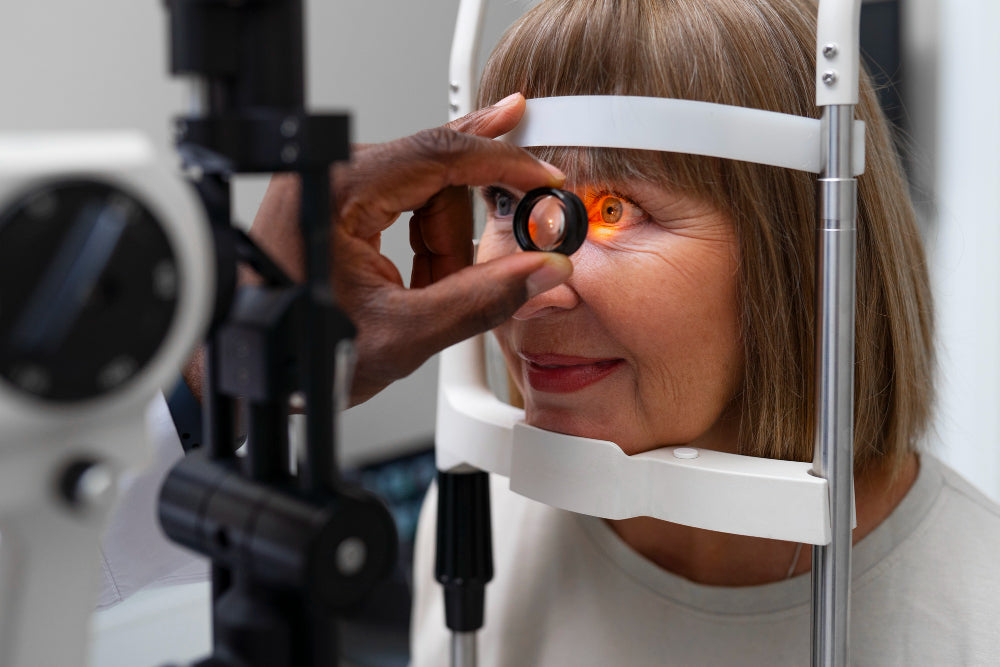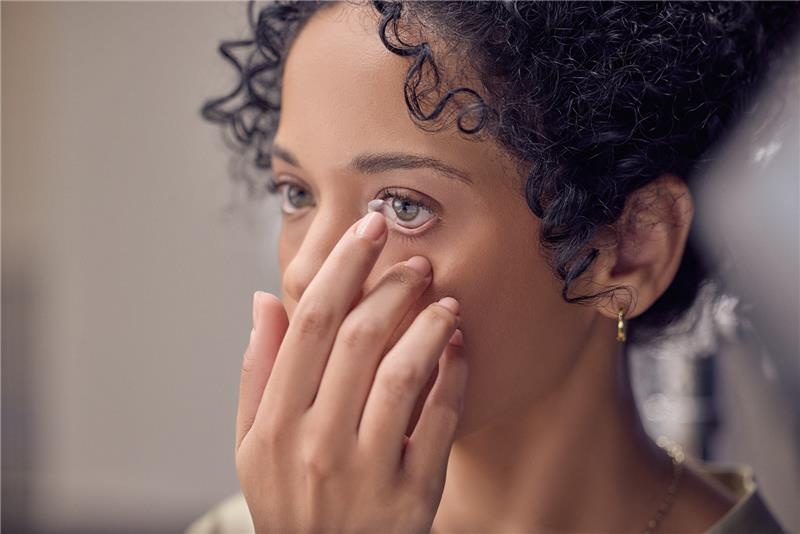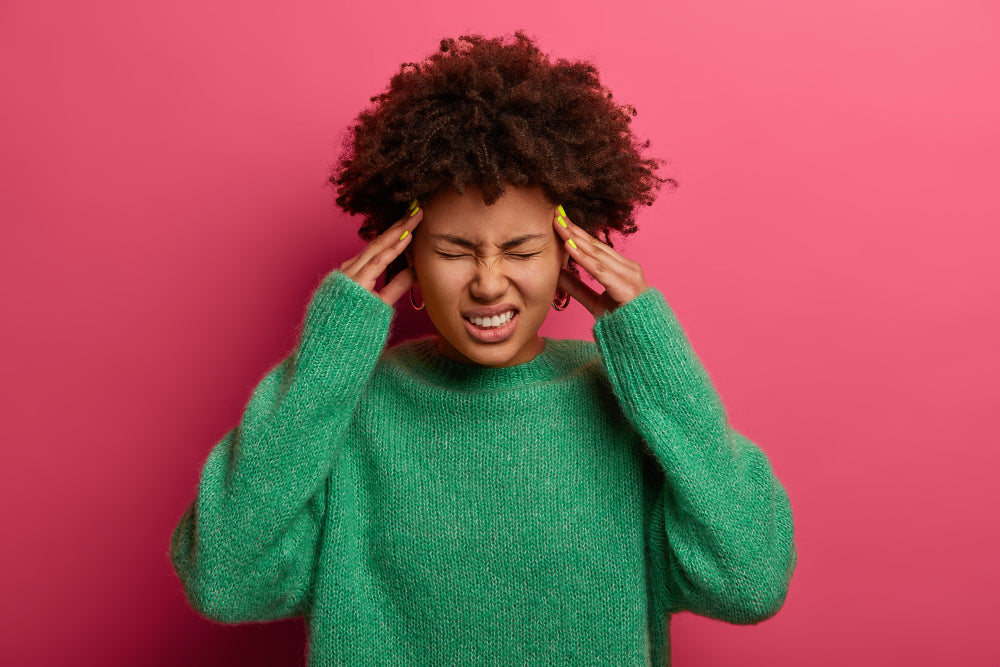Your eyes are your windows to the world, yet they're often overlooked in healthcare. From endless screen time to poor dietary choices, modern lifestyles can damage your vision. But the good news? Keeping your eyes healthy doesn't require a complete lifestyle overhaul — just thoughtful changes and consistent care.
So, what is good for eye health, and how can you protect your vision for years? Let's dive into everything you need to know about maintaining good eye health.
Why Eye Health Matters More Than Ever
Did you know that over 2.2 billion people worldwide have vision impairment or blindness? Even more surprising is that about 50% of these cases are preventable.
With rising screen usage and longer life expectancies, taking care of your eyes has never been more critical. In the present era, all age groups use digital devices.
Whether battling digital eye strain or worried about age-related conditions like macular degeneration, small but consistent steps can make a huge difference. Your eyes work tirelessly every day — it's high time to give them the care they deserve.
Get the Best Nutrition in Eye Health

A balanced diet isn't just good for your body — it's essential for your eyes, too. Nutrients like vitamin A, omega-3 fatty acids, lutein, and zinc play an integral role in maintaining good eye health.
For instance, vitamin A helps prevent dry eyes and protects your cornea, while lutein reduces the risk of cataracts and macular degeneration. Diets rich in healthy fats, like those found in fresh caught salmon and grass fed beef along with eggs and fatty dairy products can help prevent inflammation and eye disease.
Don't underestimate the power of hydration. Drinking water helps keep your eyes moist and reduces the risk of irritation. If you're wondering how to keep your eyes healthy, look no further than your plate. Make every meal an opportunity to nourish your vision. AVOID PROCESSED FOODS AND SUGAR. Low carbohydrate diets are essential to warding off type 2 diabetes, the number one cause of blindness in Americans under 50 years of age. DO NOT SMOKE ANYTHING. DO NOT VAPE. Both cause inflammation and inflammation leads to disease.
Revert The Impact of Screen Time on Healthy Eyes
In today's digital age, screen time is unavoidable. Whether working on a laptop or scrolling through your phone, prolonged exposure to screens can lead to digital eye strain, also known as computer vision syndrome. Symptoms include dry eyes, blurred vision, and headaches, now common complaints among millions.
To combat this, the 20-20-20 rule can be a game changer. Every 20 minutes, look mindfully at anything 20 feet away for 20 seconds to lessen the strain on your eyes. Studies suggest this simple practice can lower eye discomfort by up to 50%.
Adjusting your screen's brightness and maintaining a distance of at least 16 inches from your eyes can also help immensely. Remember, taking short breaks isn't just about rest — it's an essential part of eye care.
Prioritize Optimal Sleep
Sleep and eye health are an underrated connection. Good eye health doesn't stop when you close your eyes. Sleep keeps your vision sharp, and during sleep, your eyes get a chance to repair and replenish themselves.
On the contrary, poor sleep can lead to eye spasms, dryness, and an increased risk of conditions like glaucoma. Experts recommend sleeping at least 7-8 hours each night to maintain healthy eyes.
If you're struggling with sleep, consider cutting back on screen time an hour before bed. Studies show that blue light from devices can suppress melatonin production by as much as 23%, making it harder to fall asleep. By prioritizing rest, you're not just giving your body a break but nurturing your eyes.
Go for Regular Eye Exams

One of the best things you can do for your eyes is to schedule regular exams. Eye problems often develop silently, without noticeable symptoms, until they progress significantly. Conditions like glaucoma or diabetic retinopathy can be detected early during routine checkups, potentially saving your vision.
The American Optometric Association recommends having an eye exam every year, even if you think your vision is fine. For those over 40, annual checkups become even more critical as the risk of age-related eye conditions increases. The same care is advisable for your children. Think of these exams as preventive eye care — a small step now that can potentially save you from big problems later.
Exercise Regularly
Exercise and eye health have a surprising link. It's no secret that exercise is good for your heart, but did you know it's also good for your eyes? Regular physical activity boosts blood circulation, which helps your eyes receive more oxygen and nutrients. Studies have even found that active individuals are less likely to develop conditions like macular degeneration than those with sedentary lifestyles.
You don't need to hit the gym for hours to see benefits. A brisk 30-minute walk, three to four times a week, can do wonders for your body and vision. Exercise also helps reduce your risk of diabetes, one of the global causes of vision loss.
Protect Your Eyes from UV Damage
Sunlight might feel great on your skin but can harm your eyes. Prolonged exposure to UV rays multiplies the risk of eye diseases like cataracts, macular degeneration, and even cancer of the eyelids. Sunglasses aren't just a fashion statement; they're necessary for good eye health.
When shopping for sunglasses, look for ones labeled 100% UV protection. Polarized lenses are even better, reducing glare and improving eye comfort. If you spend much time outdoors, don't forget to wear a wide-brimmed hat for extra protection. Your eyes will thank you.
Avoid Smoking for Clearer Vision
Smoking isn't just harmful to your lungs and heart; it damages your eyes, too. Studies link smoking to a higher risk of developing age-related macular degeneration, cataracts, and even optic nerve damage, all of which can eventually lead to permanent vision loss.
The toxins in cigarettes reduce the amount of oxygen that reaches your eyes and can break down the eye's natural defense systems. Quitting smoking will significantly lower these risks and improve overall eye and vascular health. It's never too late to stop smoking and start healing.
Manage Chronic Health Conditions
Conditions like diabetes and hypertension silently damage your eyes over time. Diabetic retinopathy, for example, is a leading reason for blindness in adults. High blood pressure can also damage the tiny blood vessels in the retina, leading to vision problems.
Keeping these conditions under control with regular checkups, proper medication, and a healthy lifestyle can protect your eyes for the long haul. Remember, what's good for your body is good for your eyes.
Maintain Proper Lighting
Poor lighting makes your eyes work harder, especially when reading or working. Straining to see in dim or overly bright environments can lead to fatigue, dryness, and long-term visual discomfort.
To prevent this, ensure your workspace is well-lit with soft, diffused lighting that reduces glare. Task lighting—like a focused lamp for reading—can also help maintain visual clarity without overworking your eyes. Proper lighting isn't just a productivity hack; it's a small change that makes a big difference in how your eyes feel at the end of the day.
Limit Exposure to Environmental Irritants

Polluted air, dust, allergens, and smoke can irritate your eyes and trigger symptoms like redness, itching, or watery eyes. If you spend a lot of time outdoors, your eyes may be at higher risk for developing infections and allergies. Extended screen time can lead to chronic eye dryness.
Use protective eyewear when needed, keep indoor air clean with a humidifier or air purifier, and avoid rubbing your eyes with unclean hands. Your eyes are delicate, and guarding them against daily pollutants helps you maintain long-term visual wellness.
Practice Proper Eye Hygiene
Touching or rubbing your eyes with unwashed hands can introduce harmful bacteria, leading to infections like conjunctivitis (pink eye) or styes. Similarly, improper contact lens use, such as sleeping in contacts, not storing them in the proper fresh solutions, or wearing a pair beyond their intended wear schedule can damage the cornea and increase your risk of serious infections.
Make it a habit to wash your hands before touching your face, use clean towels, and replace makeup products regularly. If you wear contacts, always follow hygiene best practices. A clean eye environment equates to better vision and more visual comfort.
Avoid Harmful Beauty Practices Around the Eyes
Your daily beauty routine can unknowingly damage your eye health. Poor makeup habits, over-the-counter eye creams, and specific salon treatments near the eyes can lead to irritation, dryness, and even infections. Harsh chemicals or expired products may clog glands around your eyelids, affecting tear production and causing discomfort.
Tips to Protect Your Eyes:
-
Always remove makeup thoroughly before bed using gentle, eye-safe products
-
Avoid expired cosmetics, especially mascara (replace every 3 months)
-
Be cautious with OTC creams and treatments — choose doctor-approved formulas for the eye area
-
Reconsider lash lifts, extensions, or harsh facials that involve heavy product use near your eyes.
Healthy Stress Management Techniques Benefit Your Eyes

A calm mind can lead to clearer vision — literally. When you manage stress in a healthy way, your body produces fewer stress hormones, like cortisol and adrenaline, which can trigger eye strain, twitching, and even blurred vision or temporary vision loss.
Managing stress helps keep your eyes relaxed and focused throughout the day. Mindfulness habits like meditation, deep breathing, or yoga can improve visual comfort.
Research shows that just 10 minutes of daily mindfulness can lower stress by up to 35%, giving your eyes the break they deserve. So breathe deeply, stay present, and enjoy the visual clarity of a peaceful mind.
FAQs About Good Eye Health
1. What foods are good for eye health?
Foods rich in vitamin A, lutein, and omega-3 fatty acids, such as eggs, wild caught salmon, and grass fed beef are excellent for the eyes.
2. How often should I get an eye exam?
Adults should ideally have an eye exam every year to best suss out health problems. Annual exams are strongly recommended for children, and if you're over 40 or have existing eye conditions.
3. Can screen time permanently damage your eyes?
While screens don't cause permanent damage, prolonged use can lead to digital eye strain. Taking breaks and adjusting your screen settings can help prevent discomfort.
4. Does drinking water help your eyes?
Yes! Staying hydrated can help prevent dry eyes and blurred vision. That being said, there is no prescribed magical amount of water to drink daily. Trust your kidneys. They’ll tell you when you are thirsty. And when thirsty, drink water.
5. Can stress really affect vision?
Absolutely. Chronic stress can lead to eye strain, blurred vision, and even temporary vision loss in severe cases.
Final Thoughts: Invest in Your Eye Health

Good eye health isn't just about seeing clearly—it's about living a better, more active, more vibrant life. Small habits, such as eating nutrient-rich foods, wearing sunglasses, or simply getting enough sleep, can significantly impact your vision.
So, if you've been wondering what is good for eye health, the answer lies in a combination of care, nourishment, and regular checkups. Your eyes are worth the effort — treat them with the love they deserve, and they'll keep showing you the world's beauty for years to come.
Schedule your visit now if you have any queries about eye health.





